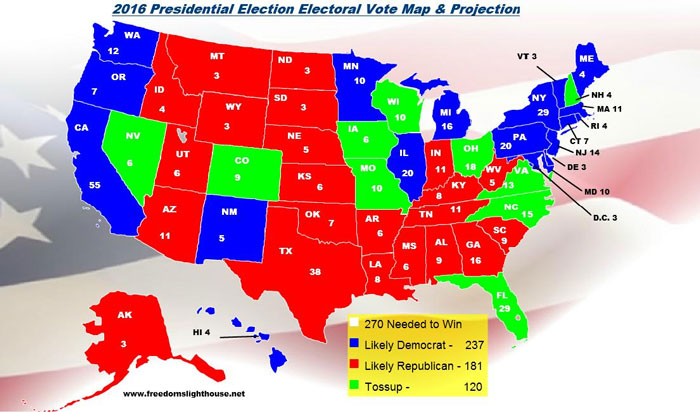|
You might not know, but the US is about to elect a new President this year. And you might think that US citizens elect their President. But you would be wrong. And therein lies a huge electoral fail.
Instead, US citizens vote for candidates, but their votes determine which electors chose the President. Each candidate submits a slate of electors, who are chosen at state party conventions or by each party's central committee. The actual people chosen to be electors don't really matter, because they don't have a choice; they are chosen to be an elector, they vote for their candidate. So far, so complicated, and so far, no big problem.
The problem comes from the fact that in all but two states, *all* the electors are chosen from the slate given by the candidate who receives the most votes in that state. (Can you name the exceptions?*) This winner-take-all aspect means that if the citizens of a given state split their votes 51%/49% between two candidates, 100% of the electoral votes from that state go to the winning candidate. In practice, this means the vast majority of states and the vast majority of votes do not matter.
* In Nebraska and Maine the electors are chosen by the popular vote in each congressional district.
For example, as the most populous state California has the most electoral votes, 55. It is virtually certain that the candidate for president nominated by the Democratic party will win the popular vote in California. So California and Californian voters don't matter. The second most populous state, Texas, has 38 votes. It is virtually certain that the Republican Presidential candidate will win in Texas. So Texas and Texans don't matter.
The map below illustrates the overall situation. Of the fifty states, which collectively have 538 votes, all but 10 are likely to vote for a particular party's candidate. Forty states which collectively have 418 votes do not matter, including the states containing the ten largest cities in the US.

The 10 states which do matter include Florida (29 votes), Ohio (18), North Carolina (15), and Virginia (13). You can expect to see those states get a lot of attention from candidates this year. In fact, the only reason for a candidate to campaign outside of these states is to raise money. Get that? We Californians contribute money to candidates so they can campaign in ten other states where the votes count!
This is the most bizarre and dysfunctional system imaginable. A huge electoral fail.
So what can be done? The most logical thing would be to simply add up the popular vote, and declare the candidate with the most votes the next President. Suddenly California and Texas and New York and Illinois would matter. But this isn't going to happen easily. Any change to the electoral laws will be made in the US Senate, where each state has two equal votes. Smaller states are not going to support a change which strongly lessens their influence.
The next most logical thing would be to have each state behave like Maine and Nebraska, and split their votes in proportion to the popular votes in their state. (Doing this by congressional districts probably makes sense.) This would vastly increase the influence of the largest states, and make the whole process more democratic. And it could be done state-by-state at the state level, without a federal change.
So why hasn't this happened? Well, consider the situation in California. Democrats control the state. Would they vote to give Republicans more than 0% say in the next election? They would not. Would the Republicans who run Texas vote to give Democrats in Texas more than 0%? They would not. So we have a bad deadlock. The small states won't vote for an overall popular vote, and the big states won't agree to split the vote within their state. The present situation is suboptimal but locked in by self-interest.
I think the only way this will change is when a President is elected who did not win the popular vote. The popular outcry against the system which allows that to happen might be strong enough to cause the Senate to change the system. This almost happened when George Bush defeated Al Gore in 2000, because he did not win the popular vote (it was very close). If it happens again, I would expect the winds of change to blow.
In the meantime, we Californians get to watch Floridians and Iowans elect our next President. Pass the popcorn.
PS... as a separate observation, note the large advantage a Democratic candidate has among the "locked in" states (56 votes!). The other day I posted a map showing party affiliation by congressional district. If you compare the two maps, the districts of states which are "in the bag" for one party but which have the opposite party affiliation are the ones which will drive change. I would expect Republicans to be more interested, both because the present system is not in their favor and because they generally support local solutions over national ones.
| 



